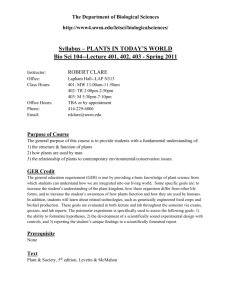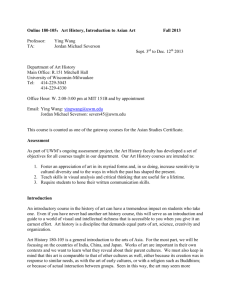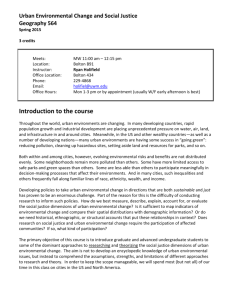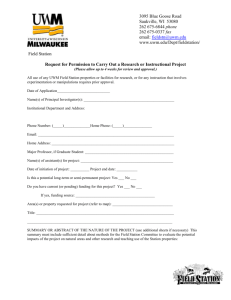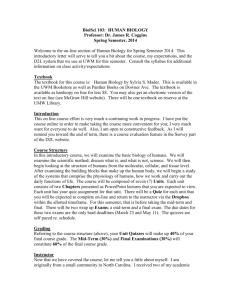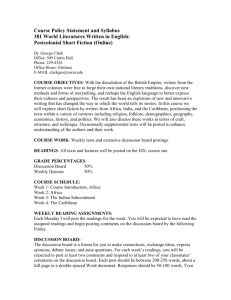Introduction to Environmental Geography
advertisement
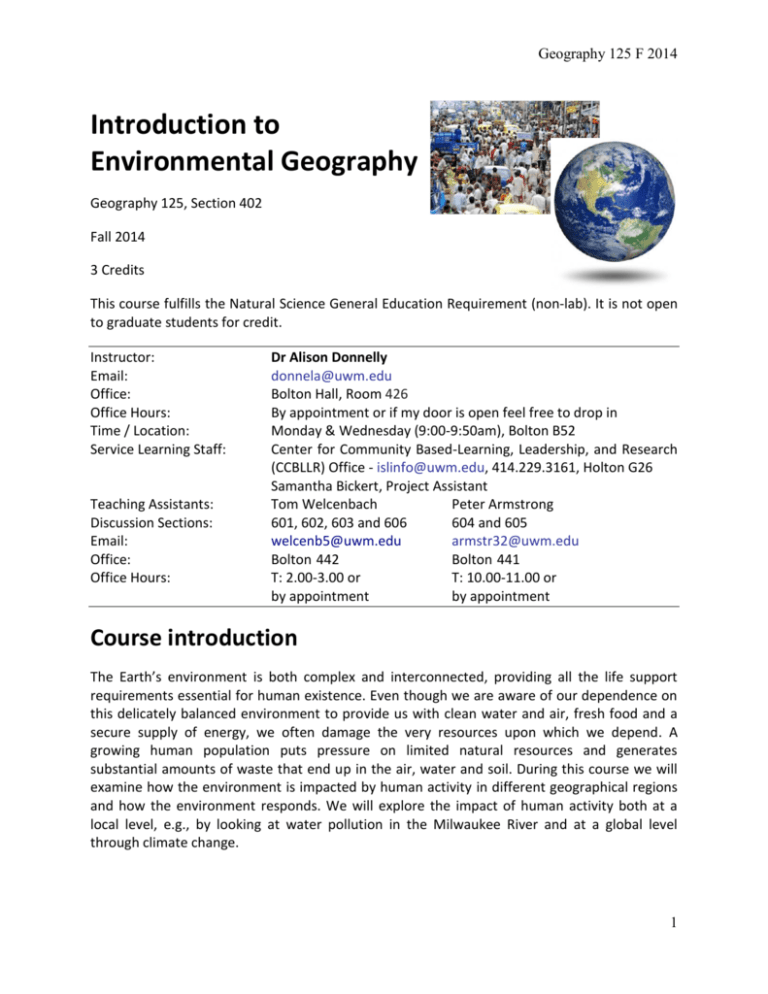
Geography 125 F 2014 Introduction to Environmental Geography Geography 125, Section 402 Fall 2014 3 Credits This course fulfills the Natural Science General Education Requirement (non-lab). It is not open to graduate students for credit. Instructor: Email: Office: Office Hours: Time / Location: Service Learning Staff: Teaching Assistants: Discussion Sections: Email: Office: Office Hours: Dr Alison Donnelly donnela@uwm.edu Bolton Hall, Room 426 By appointment or if my door is open feel free to drop in Monday & Wednesday (9:00-9:50am), Bolton B52 Center for Community Based-Learning, Leadership, and Research (CCBLLR) Office - islinfo@uwm.edu, 414.229.3161, Holton G26 Samantha Bickert, Project Assistant Tom Welcenbach Peter Armstrong 601, 602, 603 and 606 604 and 605 welcenb5@uwm.edu armstr32@uwm.edu Bolton 442 Bolton 441 T: 2.00-3.00 or T: 10.00-11.00 or by appointment by appointment Course introduction The Earth’s environment is both complex and interconnected, providing all the life support requirements essential for human existence. Even though we are aware of our dependence on this delicately balanced environment to provide us with clean water and air, fresh food and a secure supply of energy, we often damage the very resources upon which we depend. A growing human population puts pressure on limited natural resources and generates substantial amounts of waste that end up in the air, water and soil. During this course we will examine how the environment is impacted by human activity in different geographical regions and how the environment responds. We will explore the impact of human activity both at a local level, e.g., by looking at water pollution in the Milwaukee River and at a global level through climate change. 1 Geography 125 F 2014 Both the geography of environmental problems and potential solutions occur at a range of spatial scales. Although a growing number of environmental issues affect all of us, they affect us in different and unequal ways, depending on where we (the global population) live and how we engage with the environment. Consider climate change. We think of this as a global problem, but the drivers of climate change are generated at a local level. For example, greenhouse gas emissions from the burning of fossil fuels, deforestation and changing land use are all locally based but cumulatively have an impact on a global scale. At the same time, people in Niger or Kiribati (if you don’t know where Niger and Kiribati are, you will by the end of the semester!) will be affected very differently by climate change than people in Milwaukee. The purpose of this course is to introduce you to the study of this complex geography. We will pay particular attention to the environmental geography of Milwaukee, seeking to understand its connections with and differences from other geographical areas. Although an understanding of physical and environmental processes is central to this course, Geography 125 is not simply a natural-science course. Environmental geography concerns the interactions between humans and their physical surroundings. One of the fundamental principles of this course is that environmental dynamics are inseparable from social, cultural, political, and economic processes and relations. Understanding the relationships between environmental change and social/cultural processes—and specifically, issues of urban environmental justice, inequality, and sustainability—will be the focus of many of the assignments and discussions in this course. A primary aim of the course is to enable you to become a more aware, informed, and thoughtful environmental citizen, whether this course is your first step towards an environmental career or the only geography or environmental science course you ever take. Service Learning Central to Geography 125 is a required service learning component. Although an important goal of the service learning project is for you to make a worthwhile contribution to the Milwaukee community, service learning is not simply volunteer work. Instead, it is an opportunity to learn about environmental geography in a more “hands-on” way. Also, the aim of the project is not simply for you to “put in hours”, you will be expected to reflect critically on your experiences and on the mission of your organization which you will share with the class via the D2L site. We want you to serve the community, and we want you to learn as much as you can—but we also hope that you will have fun in the process. As the basis for your final journal, you must complete 10-15 hours of service during the semester. In our experience, Geography 125 students—even those with significant responsibilities outside of school—have found these requirements manageable. Also, as you will see in the agency descriptions, several of our placements are very flexible with regard to how and when you can fulfill your service. 2 Geography 125 F 2014 Required Course Materials Textbook (available from the UWM bookstore): Marsh, William M. and Grossa, John, Jr. Environmental Geography: Science, Land Use, and Earth Systems, 3rd ed. Hoboken, NJ: John Wiley & Sons, 2005. Also required: 28 3 x 5 note cards (not the sticky Post-it kind) or pre-cut 3 x 5 slips of paper (bring one to each lecture session). Please do not bring 4 x 6 or larger cards. I (Incomplete): See the UWM policy on incompletes at the following link (http://www4.uwm.edu/secu/docs/other/S31.pdf) If you take the class pass-fail (S/U), you must get the equivalent of at least a “C” to earn an “S” in the course. UWM email account: In order to succeed in this course, you need to check your UWM email account regularly. When composing emails please be sure to write “Geog. 125” at the beginning of the subject line in any emails you send; address your emails to me by name; consider the tone of your emails carefully; and finally, sign your emails by name. Please do not send emails from any non-UWM email account. The best way to reach me outside of class is via email (donnela@uwm.edu). I generally check and respond to email frequently, and except in unusual circumstances I will try to answer you within 24 hours. I will let you know if I will be away from my email account for more than 24 hours. Finally, I would be delighted to meet with you in person. Please set up an appointment, or if my office door is open, you’re free to drop in if you have a question. Desire2Learn Website (D2L): We will utilize D2L for this course. You will gain access to lecture slides, reading guides, assignments, discussion forums, quizzes, and surveys through the course D2L site (http://d2l.uwm.edu/). Lecture notes can be downloaded from the D2L website. In addition, quizzes and discussions will also be conducted in D2L. If you need help getting access to the site or to D2L, please use the UWM Help Desk (available 24 hours a day, 7 days a week), which should be your first point of contact for any technical issues you encounter: Help Desk: Bolton Hall, 225; https://www4.uwm.edu/technology/help/; (414) 229-4040 3 Geography 125 F 2014 Course Learning Objectives, Assessments, and Grades By the end of the semester, you should be able to do the following: Learning objective Assessment % of grade 1. Demonstrate knowledge of basic concepts in environmental geography and related disciplines. Attendance: 22/28 cards Syllabus/assignment quiz Midterm exam Final exam 4% 1% 2. Explain the relationship between a set of environmental data and theoretical explanations for its geographic distribution. Online mapping/analysis exercise 3. Identify and discuss the limitations and ambiguities of a set of environmental data and the possibility of alternative interpretations. Online mapping/analysis exercise 4. Explain how, by virtue of their distinctive and uneven geographies, different human communities and populations are related differently and unequally to the causes and effects of environmental problems. Discussions: Attendance 6 (of 8) assignments. helloooo 8% oooo 12% Service learning project: Registration & agreement SL Workshop 3 journals Signed time-log (min 10 hrs service) Comment helloooo 1.5% 0.5%ooooo 16% helloooo 10% ooo 2% 5. Analyze the geographic dimensions (e.g., scale, connectivity across space, etc.) of the activities of agencies or individuals working on solutions to environmental problems in a particular location. [see #4 above] 6. Evaluate the limitations to agencies or individuals working on solutions to environmental problems in a particular location, and suggest possible alternatives. [see #4 above] 15% 20% 10% 4 Geography 125 F 2014 Grading information and attendance policies 1. Lecture Attendance (4% of the final grade): During each lecture section (except session 1 and the midterm—28 sessions in all), I will collect a 3x5 index card. You should write your name and answer to a question relating to the lecture content on the card and I will collect them at the end of the class. I WILL NOT ACCEPT ANY LATE INDEX CARDS. If you do not arrive within the first 10 minutes, you may not submit a card. Each card you turn in will be worth 1 point, for a maximum of 22 (we will convert your points to a percentage score). This means you have six “free passes” during the semester, for any reason. If (and only if) you anticipate missing more than six classes because of illness, hospitalization, or personal/family emergencies, you must notify me and provide documentation in order to have an absence excused. 2. Syllabus/assignment quiz (1% of the final grade): You will complete a short D2L quiz on the syllabus and assignments during the first weeks of the semester, worth 1% of your grade. You can take the quiz as often as you like before the deadline. The quiz is designed to make sure you are familiar with the syllabus, assignment requirements and the D2L site. 3. Examinations (35% of the final grade): You will take 2 exams: a midterm worth 15% of your grade, and a final exam worth 20% of your grade. The exams will include a combination of multiple choice and true/false (based primarily on lectures, videos, and discussions). Both exams are required. Later in the semester, you will receive review sheets and more information about the exams. We will have an in-class review session before each exam. The format of the final exam will be mostly the same as the midterm, but the final will contain an additional component. Make-up exams may be permitted at the discretion of the instructor for legitimate reasons only, such as a documented illness. However, requests for make-up exams will be considered only if the student contacts me in a timely manner, preferably before the exam, but within 24 hours following the date of the exam, and provides verifiable written documentation of the reason for their absence. Do not assume that you will automatically be allowed a make-up exam. 4. Mapping/Analysis Exercise (10% of the final grade): You will complete an online mapping and geographic analysis exercise focused on issues of equity and environmental justice. You will find detailed instructions and the online quiz for the Mapping/Analysis Exercise on the D2L site. The exercise consists of two components: a. An online quiz worth 5%, or half the assignment grade. Each individual will take the quiz; you may take it as many times as you want before the deadline (so only your best score counts), but you may not take it after the deadline. The quiz is found on the D2L site. 5 Geography 125 F 2014 b. Answers to two questions for critical reflection, worth 5%, of the assignment grade. For this, you will post your answers and respond to at least one classmate in a D2L discussion forum. Your grades will be based on the rubric posted on D2L. 5. Discussions (20% of the final grade): Your discussion sections will meet eight times during the semester (see the syllabus calendar below and the discussion timetable for the meeting dates). Your discussion grade will be based on both attendance and participation (please see the discussion syllabus for details regarding how participation will be assessed). 6. Service Learning (30% of the final grade): Central to Geography 125 is a required service learning component. Although an important goal of the service learning project is for you to make a worthwhile contribution to the Milwaukee community, service learning is not simply volunteer work. Instead, it is an opportunity to learn about environmental geography in a different way. During this semester, you will work closely with a local organization that focuses on remedying a particular problem (or problems) related to humans and the environment. You will gain “hands on” experience that will provide you with a more “local” perspective on some of the issues we discuss during the lectures. You will receive more information about the project during the first three weeks of class and you will find more details about it in the assignment handout which will be distributed in your Discussion section as well as posted on the D2L site. Each individual will need to do the following: register online for a placement before the Service Learning Orientation (2 points); attend a workshop on what to expect and how to create personal and community change through your service learning experience (2 points); turn in your signed contract to me (2 points); complete 10-15 hours of service & submit a time log signed by the agency (10 points) submit a comment on classmates’ projects to a D2L discussion forum at the end of the semester (2 points). Either individually or in a group of up to four students, you will also submit 2 short journals (6 points each), in which you will answer specific questions about your project, and you will submit a final journal (12 points). If you do not complete your service and submit a signed time log, you will not receive credit for the final journal. The SL project will be discussed in detail in the discussion section. 7. Extra Credit (up to 5%): During the semester, you can take up to 7 extra credit online quizzes, which will include a combination of multiple choice, true/false, and matching questions. The quizzes will be based primarily on the textbook readings and reading guides, but they will also include questions based on the lectures and other materials. Each quiz will have a strict time limit and deadline, and you must complete your quiz before the time limit and deadline in order to receive credit. There will be no “make-up” extra credit opportunities. By taking quizzes (worth up to ½ point each), you may earn up to 3 extra percentage points over the course of the semester. There will also be non-graded practice quizzes available before each exam. Although credit is not available for the practice quizzes, I strongly encourage you to take them to help you prepare for the exams. 6 Geography 125 F 2014 Grading Policy See the following site for official UWM policy on grades and grading: (http://www4.uwm.edu/secu/docs/other/S29.htm) Guide to grades 93-100% 90-92% 86-89% 83-85% 80-82% 76-79% A AB+ B BC+ 73-75% 70-72% 66-69% 63-65% 60-62% 0-59% C CD+ D DF Special Consideration. The principle of equal treatment of all students shall be a fundamental guide in responding to requests for special consideration. No student should be given an opportunity to improve a grade that is not made available to all members of the class. This policy is not intended to exclude reasonable accommodation of verified student disability, or the completion of work missed as the result of religious observance, verified illness, or justified absence due to circumstances beyond the student's control. Comments: This policy applies to requests for special consideration both before and after a course is completed (See also Grade or Record Changes). It is usually impossible to make opportunities for grade improvement available to all students in a course after the course has ended. Examples of unacceptable opportunities for an individual student include extra work, retaking an examination, taking an extra examination, or an extension of time on an assignment or examination. The policy on incompletes (UWM Select Policies and Procedures, S-31) explains the circumstances in which a student may be given extra time for the completion of a course. This policy should reassure students who are not seeking special consideration and it should also protect instructors from student pressure for special consideration. Workload This is a 3-credit course. As a general rule of thumb, you should expect to spend 2-3 hours outside of class for every one hour in class. Since we will spend either 2 or 3 hours in class each week (depending on whether the Discussion section meets), you can expect to spend approximately 4-6 hours and at most 6-9 hours each week outside class preparing for class, working on assignments, completing service learning hours, and studying for exams. Each week you should plan to spend at least 1-2 hours reading and taking notes on your textbook and 1-2 hours working on assignments (project journals, the mapping exercise, and the final journal) and quizzes. Although you will also spend an average of 1 hour per week in service learning activities, some agencies offer opportunities to complete your service over the course of one or 7 Geography 125 F 2014 two weekends. You will be responsible for managing your time—especially your service—in order to complete your work. Activity Time in the classroom (face to face lecturing) Time spent online reading lecture and other material Time in discussions (1hr in class plus 1hr on assignment x 8 sessions) Time in service learning (placement plus communities in the round) Time taking exams (1hr midterm and 2hr final) Time in tutorials (2 review sessions before exams) Time completing assignments (1h per week on average) Time for preparation and study (3hrs on average per week) Total for term Average per week NOTE: THESE NUMBERS ARE APPROXIMATE!!! # hrs 24 24 16 16 3 2 15 45 145 9-10 Classroom conduct I expect that you will conduct yourself in both lecture and discussion in the same manner that you yourself would like to be treated and to respect the rights of other students to learn. Class disruptions will not be tolerated, as it erodes the educational environment for everyone. Please be respectful of your fellow classmates. Come to class on time, stay until the end, and remain quiet during lectures (unless I’m trying to get you to contribute to a conversation in class, in which case quiet is the last thing I want you to be!!). If you must come in late or leave early, please sit near an exit and avoid distracting other students or disrupting the class. I also expect you to acknowledge and respect the diversity of participants in the class. At times we will discuss controversial issues in this course, and students in the class will not always be on the same side. Your task is not to “win” debates, and it is certainly not to dismiss some points of view, perspectives, or experiences as incorrect or irrelevant without considering them carefully and critically. On the contrary, you should seek to develop an understanding of the different positions in debates about the environment—including positions that differ from your own— and to challenge your own preconceptions. Even if you disagree with points of view expressed by your instructor, your teaching assistants, or your fellow students, as citizens of this class you are responsible for considering different points of view respectfully. The instructors will do the same. Unless you have a VISA from the Student Accessibility Center or other documentation that you have special needs, you will not need laptops or other electronic devices during class. All wireless and electronic devices must be shut down or in silent mode during the class period. 8 Geography 125 F 2014 Late work To be fair to students who turn their work in on time, you will not receive credit for assignments turned in late, unless a documented medical or personal emergency arises. Please contact the instructor or the TA immediately if an emergency arises, or prior to the deadline if you know you will have a problem turning your work in on time. Please note that “the D2L dropbox [or discussion forum] didn’t work” is not an acceptable excuse for a late assignment; you are responsible for making sure your assignment reaches the dropbox or discussion forum. You should email the instructor immediately—and before the assignment is due—if you have technical difficulties submitting your assignment to the D2L site. Make-up exams In order to be fair to all students taking this course, you may not make up exams or resubmit coursework unless a documented medical or personal emergency arises. In the event that you must be absent on the day of an exam, you must contact the instructor immediately to reschedule a make-up exam and submit a signed make-up exam form (available on D2L). Technology D2L site: You will gain access to lecture slides, reading guides, assignments, discussion forums, quizzes, and surveys through the course D2L site: (http://d2l.uwm.edu/). In order to reach the site, simply log in using your Panther ID and password, and then follow the instructions to find the course site. If you need help getting access to the site or to D2L, please use the UWM Help Desk (available 24 hours a day, 7 days a week), which should be your first point of contact for any technical issues you encounter: Help Desk web site: (http://www4.uwm.edu/technology/help/) Help Desk Telephone: (414) 229-4040 Submit Help Request: GetTechHelp.uwm.edu Help Desk Location: Bolton 225 For a handout on accessing D2L visit: (http://www.uwm.edu/Dept/LTC/docs/firstdayhandout.doc) Software: The computer you use must have a basic word processing package such as Word for Windows, and you should know how to use it. You will also need to be able to view PowerPoint files (lecture slides) and PDF files (reading guides, other readings). You can view these files using free downloads. 9 Geography 125 F 2014 University policies and special notes For the University of Wisconsin-Milwaukee’s official policies on disabilities, religious observances, active military duty, incompletes, discriminatory conduct, academic misconduct, complaint procedures, and grade appeal procedures, please see the following web site: (http://www.uwm.edu/Dept/SecU/SyllabusLinks.pdf). Geography 125 adheres to these policies. Students with Disabilities: If you have a disability and need accommodations of any kind (e.g., a notetaker, special accommodations for tests, etc.), please see me and submit your VISA from the Student Accessibility Center within the first two weeks of the semester. I’ll be happy to work with you to make any necessary arrangements. For more information, see the following: (http://www4.uwm.edu/sac/SACltr.pdf). Religious observances: If you require accommodations for religious observances, I’m happy to work with you to make necessary arrangements. Please note that you are required to notify me within the first three weeks of the semester of the specific dates on which you will request relief from an examination or academic requirement: (https://www4.uwm.edu/secu/docs/other/S1.5.htm). Academic misconduct: You are responsible for reading and following UWM guidelines on academic misconduct, including cheating and plagiarism: (http://www4.uwm.edu/dos/conduct/). If any of the instructors suspects academic misconduct, we are required to follow the procedures described here: (http://www4.uwm.edu/acad_aff/policy/academicmisconduct.cfm). Incompletes: “An Incomplete may be given to a student who has carried a subject successfully until near the end of the semester but, because of illness or other unusual and substantiated cause beyond that student's control, has been unable to take or complete the final examination or to complete some limited amount of term work. An Incomplete is not given unless the student proves to the instructor that s/he was prevented from completing course requirements for just cause as indicated above.” (quoted from UWM policy: http://www4.uwm.edu/secu/docs/other/S31.pdf) If you have questions or concerns about the class, please do not hesitate to contact the instructor or the teaching assistant. 10 Geography 125 F 2014 Tentative Discussion Calendar Wk 1- (Sept. 3) Wk 2- (Sept. 8 & 10) Wk 3- (Sept. 15 & 17) No Discussion Disc.1: Sustainability & Service Learning Wk 4- (Sept. 22 & 24) Wk 5- (Sept. 29 & Oct. 1) Wk 6- (Oct. 6 & 8) Wk 7- (Oct. 13 & 15) Wk 8- (Oct. 20 & 22) Wk 9- (Oct. 27 & 29) Wk 10- (Nov. 3 & 5) Wk 11- (Nov. 10 & 12) Wk 12- (Nov. 17 & 19) Wk 13- (Nov. 24 & 26) Wk 14- (Dec. 1 & 3) Wk 15- (Dec. 8 & 10) Disc.2: Ecosystems: local and global No Discussion Disc.3: Population and Food Disc.4: Energy and the Environment No Discussion: Review & Midterm Disc.5: Climate Change No Discussion Disc.6: Water Resources Disc.7: Hazardous Waste No Discussion Disc.8: Global environmental management No Discussion Service Learning registration (before 9/22) No Discussion SL Journal 1 (due Wed. 10/8) SL Journal 2 (due Wed. 11/12) SL Journal 3 (due Wed. 12/3) Time log/comment (due in class Wed. 12/10) Service Learning Dates to Remember Student Online Registration for CCBLLR Account 22nd September Registration due for Geog 125 placement 22nd September Note: CCBLLR will close its online registration system on 22nd September Service Learning Class Presentation 10th September Communities in the Round 17th September Wisconsin Room Union 9.00 – 9.50 Discussion 1 10.00-10.50 Monday BOL 262 Discussion 2 11.00-11.50 Monday BOL 262 Discussion 3 12.00-12.50 Monday BOL 262 Discussion 4 9.00-9.50 Tuesday BOL 262 Discussion 5 - 11.00-11.50 Tuesday BOL 262 Discussion 6 10.00-10.50 Wednesday BOL 262 11 Geography 125 F 2014 Tentative Lecture Schedule Wk. Lec 1 2 3 4 5 6 7 8 9 10 11 12 13 14 15 Date Topic Reading Service Learning Disc. Registration (due Mon. 9/22) None 1 Sept 3 Course Introduction 2 Sept 8 Environment and Humanity Ch.1-2 3 Sept 10 Concepts in Environmental Geography Ch.3 4 Sept 15 Global Cycles and Systems Ch.4 5 Sept 17 Service Learning Orientation: Wisconsin Room Union 9.00 – 9.50 6 Sept 22 7 Sept 24 8 Sept 29 9 Oct 1 10 Oct 6 11 Oct 8 12 Oct 13 13 Oct 15 14 Oct 20 Review 15 Oct 22 Midterm Exam 16 Oct 27 Ch.10 17 Oct 29 Atmosphere and Climate (Review Midterm) 18 Nov 3 19 Nov 5 Air pollution Ch.11 20 Nov 10 21 Nov 12 Water Resources Ch.12 22 Nov 17 Water Pollution Ch.13 23 Nov 19 Hazardous Waste Ch.14 24 Nov 24 Soil and Land Ch.15 25 Nov 26 26 Dec 1 Biodiversity Ch.16 27 Dec 3 Open-Land Resources Ch.17 28 Dec 8 Global Environmental Management Ch.18 29 Dec 10 Review and Summary Ecosystems Ch.5 Frontier Environments Ch.6 Human Population Ch.7 Agriculture, Food and Hunger Ch.8 Energy and the Environment Ch.9 SL Presentation Disc. 1 None Disc. 2 SL Agreement due 10/1 None Journal 1 (due Wed. 10/8) Disc. 3 Disc. 4 None Mapping Exercise (Quiz W 11/5, Disc Qs F 11/7 response M 11/10) Disc. 5 None Journal 2 (due Wed. 11/12) Disc. 6 Disc. 7 None Thanksgiving break!!! Journal 3 (due Wed. 12/3) Time log & comment (due Wed. 12/10) Disc. 8 None Final Exam: Wednesday, 17 December 2014, 10:00am - 12:00pm, Bolton B52 12
